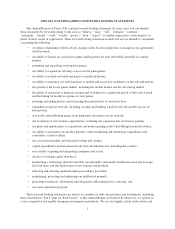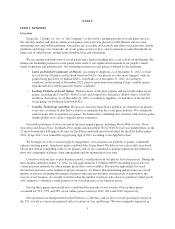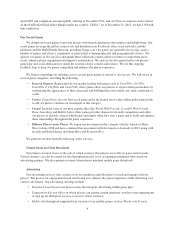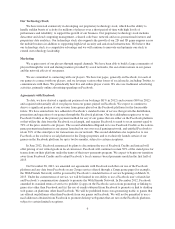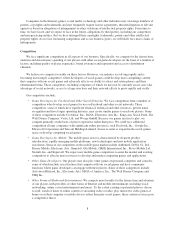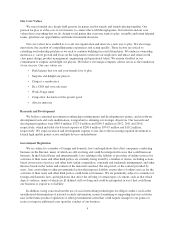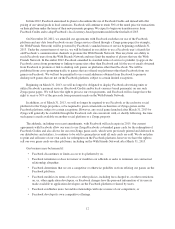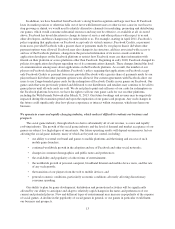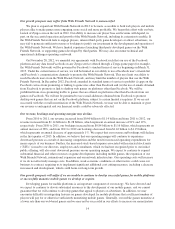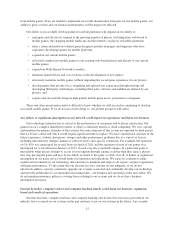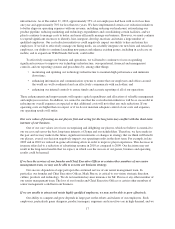Zynga 2012 Annual Report Download - page 16
Download and view the complete annual report
Please find page 16 of the 2012 Zynga annual report below. You can navigate through the pages in the report by either clicking on the pages listed below, or by using the keyword search tool below to find specific information within the annual report.Companies in the Internet, games, social media, technology and other industries may own large numbers of
patents, copyrights and trademarks and may frequently request license agreements, threaten litigation or file suit
against us based on allegations of infringement or other violations of intellectual property rights. From time to
time, we have faced, and we expect to face in the future, allegations by third parties, including our competitors
and non-practicing entities, that we have infringed their copyrights, trademarks, patents and other intellectual
property rights. As we face increasing competition and as our business grows, we will likely face more claims of
infringement.
Competition
We face significant competition in all aspects of our business. Specifically, we compete for the leisure time,
attention and discretionary spending of our players with other social game developers on the basis of a number of
factors, including quality of player experience, brand awareness and reputation and access to distribution
channels.
We believe we compete favorably on these factors. However, our industry is evolving rapidly and is
becoming increasingly competitive. Other developers of social games could develop more compelling content
that competes with our social games and adversely affects our ability to attract and retain players and their
entertainment time. These competitors, including companies of which we may not be currently aware, may take
advantage of social networks, access to a large user base and their network effects to grow rapidly and virally.
Our competitors include:
•Game Developers for Facebook and Other Social Networks: We face competition from a number of
competitors who develop social games for use on Facebook and other social networks. These
competitors, some of which have significant financial, technical and other resources, greater name
recognition and have longer operating histories, may create similar games to reach our players. Some
of these competitors include Crowdstar, Inc., DeNA, Electronic Arts Inc., King.com, Social Point, The
Walt Disney Company, Vostu, Ltd. and Wooga GmbH. Because our games are free to play, we
compete primarily on the basis of player experience rather than price. We could face additional
competition if large companies with significant online presences, such Facebook, Inc., Google Inc.,
Microsoft Corporation and Tencent Holdings Limited, choose to enter or expand in the social games
space or develop competing social games.
•Game Developers for Mobile: The mobile game sector is characterized by frequent product
introductions, rapidly emerging mobile platforms, new technologies and new mobile application
storefronts. Some of our competitors in the mobile game market include Addmired, DeNA Co. Ltd.,
Disney Mobile, Electronic Arts, Gameloft, Glu Mobile, GREE International Inc., Rovio Mobile Ltd,
Storm8, Inc. and Supercell. We expect new mobile-game competitors to enter the market and existing
competitors to allocate more resources to develop and market competing games and applications.
•Other Game Developers: Our players may also play other games on personal computers and consoles,
some of which include social features that compete with our social games and have community
functions where game developers can engage with their players. Some of these competitors include
Activision Blizzard, Inc., Electronic Arts, SEGA of America, Inc., The Walt Disney Company and
THQ Inc.
•Other Forms of Media and Entertainment: We compete more broadly for the leisure time and attention
of our players with providers of other forms of Internet and mobile entertainment, including social
networking, online casual entertainment and music. To the extent existing or potential players choose
to read, watch or listen to online content or streaming video or radio, play interactive video games at
home or on their computer or mobile devices rather than play social games, these content services pose
a competitive threat.
8





